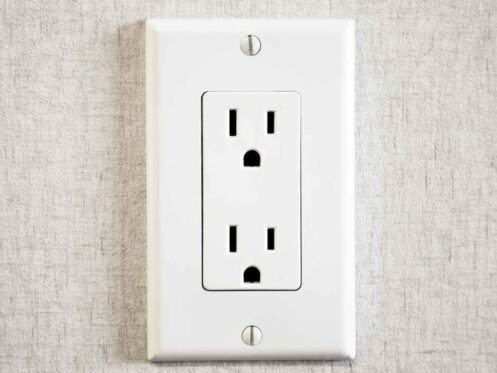That low, persistent buzz coming from your outlet isn’t something to ignore. Electrical outlets are designed to operate silently, so any unexpected noise is a clear signal that something isn’t right. For homeowners, these unusual sounds can point to underlying electrical problems that pose real risks—ranging from damaged devices to potential fire hazards.
Thankfully, there are ways to identify the cause and respond appropriately. In this blog, we’ll walk you through what that buzzing could mean, what causes it, and how to know when it’s time to get professional help. And when you do, Dream Team Plumbing, Heating, Cooling & Electrical is always here to protect your home and your peace of mind.
What It Means When Your Outlet Is Buzzing
Hearing a buzzing or humming sound coming from an electrical outlet is never normal. While it might seem like a small annoyance at first, it’s actually your home trying to tell you something is wrong. Outlets are meant to deliver electricity quietly and efficiently—so when they start making noise, there’s usually a fault in the system.
This kind of issue is fairly common, especially in older homes or homes with aging electrical components. Buzzing outlets can be caused by loose wiring, worn-out connections, or even a failing outlet that’s on the brink of shorting out. If left unresolved, these issues can lead to serious consequences such as electric shocks, damaged appliances, or in extreme cases, electrical fires.
The sooner you address the issue, the better. That soft buzz could be the first warning sign of a much larger problem. Let’s take a closer look at what symptoms to watch for—and what might be causing them.
Key Signs and Possible Causes
When an outlet starts buzzing, it’s rarely an isolated event. Most of the time, there are other warning signs or contributing factors at play. Understanding what to look for and why it’s happening can help you take the right next steps.
Common Signs
Keep an eye (and ear) out for the following signs that could indicate a buzzing outlet problem:
-
Buzzing or humming noise when something is plugged into the outlet
-
Outlet feels warm or hot to the touch, even with light usage
-
Lights flicker or dim when using the outlet
-
Scorch marks or discoloration around the outlet plate
-
Burning or smoky smell coming from the outlet area
-
Devices shut off unexpectedly or behave oddly when plugged in
If you notice one or more of these signs, it’s important to stop using the outlet and investigate further.
Causes/Why It Happens
Several common issues can cause an outlet to start buzzing. Here’s a breakdown of what might be going wrong:
-
Loose wiring: Over time, the wires inside the outlet box can loosen due to wear, vibration, or poor installation. This creates weak connections that may buzz as electricity flows through.
-
Worn-out outlet: Just like anything else, outlets wear down. Older outlets might not hold plugs securely or distribute power evenly.
-
Overloaded circuit: Plugging too many devices into one outlet or using high-draw appliances can cause stress on the circuit, leading to noise and overheating.
-
Improper grounding or reversed polarity: Incorrect wiring during installation or repairs can lead to unsafe and unstable current flow.
-
Faulty appliances: Sometimes, the problem isn’t the outlet at all—a damaged or malfunctioning device could be generating electrical interference.
-
Aging electrical system: In homes with outdated wiring, the entire electrical system may be prone to issues that show up as buzzing or other strange behavior.
How to Fix a Buzzing Outlet
Once you’ve identified the symptoms and possible causes of a buzzing outlet, the next step is figuring out what to do about it. Some issues are simple enough for homeowners to assess, while others require professional attention to ensure safety and code compliance.
DIY Solutions
If the problem seems minor, there are a few safe steps you can take before calling in the pros:
-
Unplug everything: Stop using the outlet immediately and unplug any devices connected to it.
-
Test the outlet alone: Wait a few minutes, then check if the buzzing continues with nothing plugged in. If it does, that’s a red flag.
-
Reset the breaker: If the outlet is part of a GFCI or AFCI circuit, try resetting the breaker or outlet to see if that resolves the issue.
-
Use another appliance: Plug the same device into a different outlet. If the buzzing follows the device, the issue may lie with the appliance—not the outlet.
If none of these steps help or if you’re unsure at any point, it’s time to get professional help.
When to Call a Professional
Some problems go beyond DIY and require expert care. Call a licensed electrician if:
-
The buzzing persists even when nothing is plugged into the outlet
-
The outlet feels hot, has burn marks, or emits a burning smell
-
Multiple outlets or lights are buzzing, flickering, or acting up
-
You hear buzzing from inside the wall or breaker panel
-
Your home has older wiring or hasn’t had an electrical inspection in years
Electrical issues can escalate quickly and pose serious safety hazards, so don’t take chances if you’re unsure. A trained professional can quickly diagnose the root cause and make safe, lasting repairs.
Tips to Prevent Outlet Problems in the Future
The best way to deal with a buzzing outlet is to stop the issue before it starts. With a little preventative care, you can protect your outlets, your devices, and most importantly, your home.
Here are some helpful tips to avoid future electrical problems:
-
Avoid overloading outlets: Don’t plug too many devices into one outlet, especially high-wattage appliances. Use power strips with surge protection if necessary.
-
Inspect outlets regularly: Keep an eye on outlets for signs of damage, wear, or looseness. If something feels off, have it checked out.
-
Use surge protectors: These help prevent damage from power surges and reduce the risk of buzzing caused by overloaded circuits.
-
Keep cords in good condition: Frayed or damaged cords can create electrical noise and safety hazards. Replace worn cords right away.
-
Schedule electrical inspections: Especially in older homes, routine inspections can uncover outdated wiring or unsafe conditions.
-
Replace outdated outlets: If your home still uses two-prong outlets or outlets that feel loose when plugging something in, consider upgrading to modern, grounded ones.
-
Hire professionals for electrical work: DIY might be tempting, but incorrect wiring can cause more harm than good. Always choose licensed professionals.
By following these tips, you can reduce your risk of buzzing outlets and keep your electrical system running safely and smoothly.
Wrap-Up: Don’t Ignore a Buzzing Outlet
A buzzing outlet might seem like a small issue, but it’s often a sign of a larger electrical problem waiting to happen. Whether it’s caused by loose wiring, an overloaded circuit, or a faulty appliance, it’s not something to shrug off. Taking quick action protects your home, your electronics, and your family’s safety.
If you’ve noticed any buzzing sounds, warm outlets, or flickering lights, it’s time to take a closer look. And when it’s beyond a quick fix, don’t risk your safety by guessing.
Contact Dream Team Plumbing, Heating, Cooling & Electrical to inspect, repair, or replace problem outlets—so you can enjoy peace of mind and a safer home.



